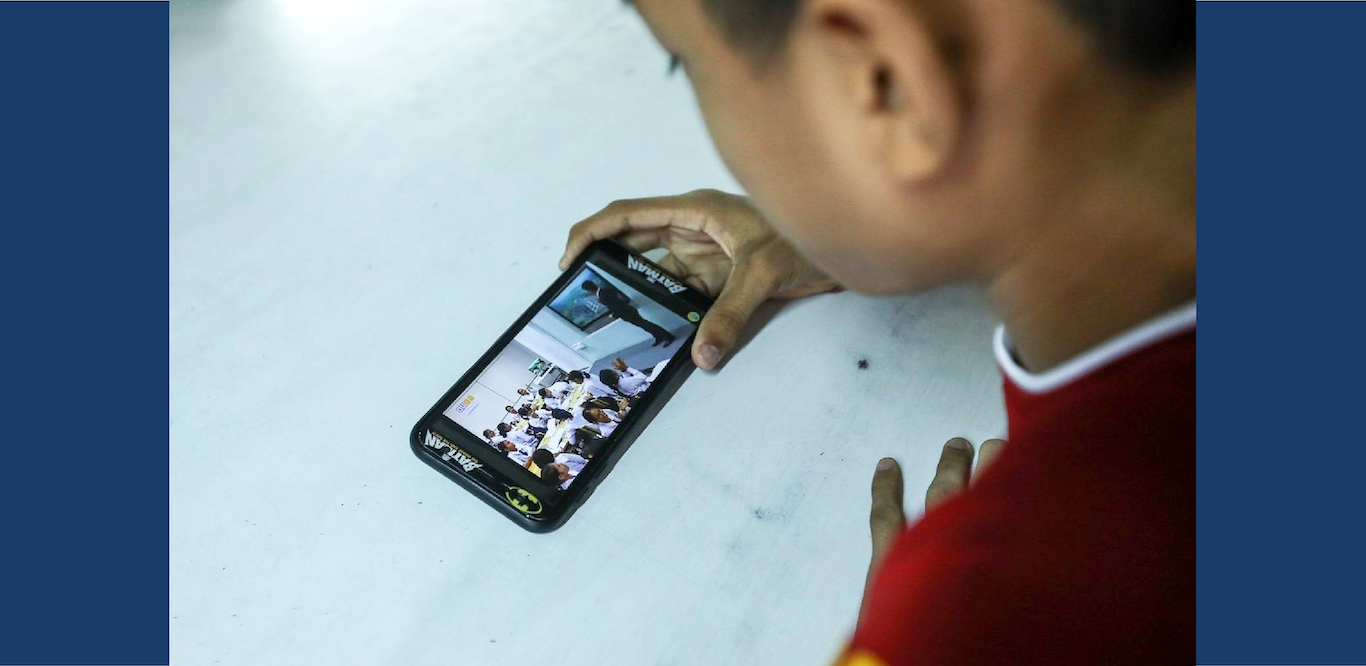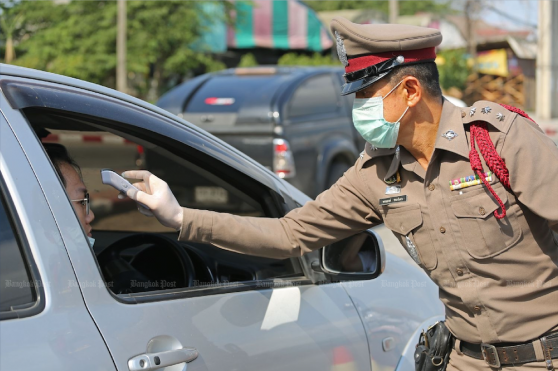Minister Buddhipongse plans to recruit 72 thousand “Digital volunteers” nationwide to find solution for citizens challenged in accessing technology in the new normal of Covid-19 Era
As Covid-19 accelerated digital transformation, the digital world definitely plays a significant role in the daily lives of the people. Online world has become the new normal for all of us, evidently through online shopping, online food delivery, telework, teleconference or even online education. However, not everyone has access to the digital world, not everyone is ready for this transition, and many are vulnerable from missing this train.
In the recent RoLD Virtual Forum : Living with COVID-19 on “How to Empower Digital Citizenship in COVID-19 Era”, hosted by the Thailand Institute of Justice (TIJ), Prof. Dr. Kittipong Kittayarak, Executive Director, TIJ, gave examples of many citizens who do not have access to the digital world by referring to internet penetration statistics from the International Telecommunication Union. The statistics show that developed countries have 87 percent of household that can access the internet, while in developing countries is 47 percent and least developed countries is 19 percent. In Thailand, the figure is 68 percent, which is higher than the global average of household that can access the internet which is 55 percent.
However, the numbers do not indicate of the quality of the internet access that generate real benefits, for example, in Australia, children from the age of 5-14 years old still face challenges accessing education through the internet due to lack of conducive environment for learning, lack of suitable devices and lack of proper internet speed. It is worth deliberating how COVID-19 has accelerated the digital transformation and how we can systematically develop digital citizen by leaving no one behind. In education context, 25 percent of Thai students in universities are from households with average annual income of no more than 200,000 Baht; which means they are in urgent need of skills development to prevent unemployment.
 Digital Economy and Society Minister Buddhipongse Punnakanta agrees that COVID-19 is a catalyst that has driven exponential increase of digital technology uses for people’s daily lives. Citizen group who has never thought of using these technologies are inevitably forced to adapt and learn to use technologies in a short period of time to shift to teleworking. On a positive note, the situation enabled this citizen group to embrace the digital world.
Digital Economy and Society Minister Buddhipongse Punnakanta agrees that COVID-19 is a catalyst that has driven exponential increase of digital technology uses for people’s daily lives. Citizen group who has never thought of using these technologies are inevitably forced to adapt and learn to use technologies in a short period of time to shift to teleworking. On a positive note, the situation enabled this citizen group to embrace the digital world.
Mr. Buddhipongse revealed Thailand’s digital technology usage which accounts for 93.39 million mobile devices, daily average internet use is 9 hours per day, with 108 percent mobile broadband subscription penetration, mobile device access capability is as high as 187 percent, which means 1 person owns almost 2 devices on average and 69 percent of the population access online market.
Despite the statistics, the Digital Economy and Society Minister admits that many people still do not have access to these technologies, even those who reside in Bangkok Metropolitan. Even though the networks are well connected and developing towards 5G technology, 20-30 percent of the citizens in densely populated communities are unable to engage in online activities due to poverty, posing challenge in accessing suitable devices. During the Covid-19 outbreak, people experienced income losses, retrenchments, salary reduction or extensive decline of income. Particularly amongst taxi drivers or motorcycle taxi drivers, they unknowingly became a vulnerable group in the digital world. Considering these challenges, the government is planning to recruit “digital volunteers” as a tool to conduct survey and connect data between the government and the communities.
“Digital volunteers are citizens in the communities who work in connected networks to conduct survey on technological needs between communities and government entities, so the government can offer targeted solutions. Some locations may have existing network infrastructure, but it has not been exploited to its full potential due to lack of devices, state of poverty or lack of skills. The first batch digital volunteers will consist of 72,000 citizens, which is equivalent to the number of villages in Thailand.”
During the telework period in the past 1-2 months, the Ministry of Digital Economy and Society offered government officials and state enterprise employees to register for telework with internet fee support from the government. Over 700 thousand government officials registered for this scheme. The Minister stated that this scheme will enable the officials to embrace the digital world and also enhance the e-Government platform or optimization of big data in public affairs, which has long been requested by the public.
The Minister of Digital Economy and Society further revealed that the authority will take advantage of this period to establish big data from all the information from the back offices of all government entities under 5 strategic public affairs namely public health, labour, tourism, agriculture and finance & banking. For example, in public health, patients’ information nationwide can be consolidated into a single database, where the information can be shared to any public and private hospitals to provide best medical treatment and also this may lead to enhanced healthcare reimbursements system as well.
“The Internet is not a luxury, it is a necessity” Key variable towards a full-fledged digital country.
 Former President of the United States, Mr. Barak Obama once said that “The internet is not a luxury, it is a necessity.” Ms. Supinya Klangnarong, former Commissioner of The Office of The National Broadcasting and Telecommunication Commissions (NBTC) and co-founder of Cofact Thailand & Digital Thinkers Forum cited this quote and reiterated that in order for the people to complete the transformation to true digital citizens, the government has to focus on access to the internet. Despite the increased statistics of mobile devices use in Thailand in the past years, challenges in online learning still persists. She gave an example that 75 percent of internet users on mobile devices still use prepaid subscription plan, which is not ideal to online learning or telework, therefore the authority and NBTC will need to address this challenge immediately.
Former President of the United States, Mr. Barak Obama once said that “The internet is not a luxury, it is a necessity.” Ms. Supinya Klangnarong, former Commissioner of The Office of The National Broadcasting and Telecommunication Commissions (NBTC) and co-founder of Cofact Thailand & Digital Thinkers Forum cited this quote and reiterated that in order for the people to complete the transformation to true digital citizens, the government has to focus on access to the internet. Despite the increased statistics of mobile devices use in Thailand in the past years, challenges in online learning still persists. She gave an example that 75 percent of internet users on mobile devices still use prepaid subscription plan, which is not ideal to online learning or telework, therefore the authority and NBTC will need to address this challenge immediately.
Ms. Supinya emphasized that to order to complete the transformation towards digital citizen, the key factor is creating trust amongst the citizen towards the system, it is important that the government operates under the rule of law and encourage people’s participation by having open data and transparent legislation, as well as enabling stakeholders engagement. An example of successful country is “Estonia”, where people truly trust the system provided by the government based on a principle of integrity. In Estonia, data is collected one time by a designated entity, where information is systematically utilized with assurance that if there is a use of personal information without consent, the citizens can challenge the system. Estonia has become a model for countries in the European Union, an exemplar of how human rights, privacy, and digital transformation can co-exist in harmony.
“Covid-19 marks an online education milestone for Thailand”
 Feedback from online education in many locations revealed many challenges such as access to the internet, access to the appropriate tools and insufficient technology skills. Prof. Dr. Suchatchavee Suwansawat, Rector of King Mongkut’s Institute of Technology Ladkrabang stated that online learning has long existed in foreign countries. In Thailand, before Covid-19 pandemic, many universities are well equipped with high-speed internet and online learning platform, which of many are free of charge. However, online learning in Thailand was unsuccessful due to tension amongst educators who are not ready to transition from classroom-based learning to online, because the traditional learning method is a comfort zone for educators.
Feedback from online education in many locations revealed many challenges such as access to the internet, access to the appropriate tools and insufficient technology skills. Prof. Dr. Suchatchavee Suwansawat, Rector of King Mongkut’s Institute of Technology Ladkrabang stated that online learning has long existed in foreign countries. In Thailand, before Covid-19 pandemic, many universities are well equipped with high-speed internet and online learning platform, which of many are free of charge. However, online learning in Thailand was unsuccessful due to tension amongst educators who are not ready to transition from classroom-based learning to online, because the traditional learning method is a comfort zone for educators.
During to Covid-19 outbreak, the Council of University Presidents of Thailand came to a resolution to suspend school from mid-March 2020 and announced that all teachings will be completely relocated to online learning, therefore transition to online learning happened over night. Figure from Microsoft showed that before Covid-19 outbreak, there were approximately 10,000 online learning users, but subsequently after the outbreak, numbers rose to hundreds of thousand, therefore “Covid-19 marks an online education milestone in Thailand”.
Prof. Dr. Suchatchavee admits that disparity still exists in online learning because various institutions may not be at the same pace in terms of readiness. Many professors or teachers were not prepared so assistance was provided by gathering those in need of support and experts from the faculty together. Moreover, most students are still using the internet through a prepaid subscription plan, which is not ideal for online learning. These issues need to be urgently addressed, hence, the situation of the Covid-19 has both its advantage and limitations.
The obvious “advantage” is, this situation tremendously narrowed down the gap of online learning between Thailand and developed countries. The exponential increase of online learning in Thailand is a result of the Covid-19 outbreak. Furthermore, the pandemic had thrusted the citizens of Thailand towards digital transformation through telework or teleconference, which exhibits such quick development of Thai people’s digital skill and proficiency.
However, Prof. Dr. Suchatchavee does not agree with the “limitation” that has been an ongoing argument on how online learning is only suitable for graduate students and will not yield good result in pre-school students. He sees that pre-school children can focus with online learning with the presence of parents; therefore, age suitability is not the main issue.
In Prof.Dr. Suchatchavee’s opinion, the concerning issue is how the online education causes “educator” a vulnerable occupation. Teachers will fall into comparative trap, where winner takes all. Children all over the world will seek to learn from the best teacher online, the best teacher will educate billions of students and only competitive platforms will survive and win. Thai education will need to prepare for this battle.
The key question is how we can prepare our children to thrive in the future. The world is in transition from Globalization to Localization, a country should establish its complete ecosystem by establishing conducive environment. The law should enable citizens to fully trust local platforms designed by the government. Stringent penalty and liability shall be imposed for any breach of privacy by any government official. Issue of access to technology should be addressed, particularly prepaid subscription plans which are not suitable for online activities. Investment should be place into human resources from fundamental levels starting from pre-school children in education technology, so Thailand can be competitive in the global context. It is vital in instill nationalism so Thai citizens believe we can be competitive.
“Learning journey” pathway for Thai people towards becoming Digital citizen
“A lesson learned journey starts from individual and Thailand education system towards establishing high performance team.”

Mr. Charun Ngamwirotcharoen, Chief Data Scientist of Sertis Co.Ltd., replied to the question on Thailand’s pathway to catch the train of technological development from Covid-19 situation as the main catalyst.
A good example can be learned from American football sport. This is a sport that requires planning from the stage of recruiting athletes to game strategies for continuously changing environment. Professional football teams normally plan their game strategies and training for various unprecedented situations. In the recent Super Bowl, Kansas City Chief’s points were far behind the opposing side in the third quarter of the game, so they decided to use new tactics, so they finally made a comeback to win the game.
Mr. Charun also gave other examples on training and adapting tactics to address challenges derived from the principles of organization and business management.
Organization that will succeed in digital transformation during Covid-19 pandemic will need characteristics of a high-performance team. Employees are well aware of their roles and responsibilities, creating collaborative network in making collective decisions, and working towards a common goal, which is on the contrary to organization that focus on command and control by a solo competent leader.
Other aspects that each organization should emphasize is to focus on the best performance through policy and guideline on how organizations can be resilient after facing challenges by empowering small teams and encourage information sharing.
For organizations to grow and sustainably development, keywords like “resilience” or “flexibility” often appear in business organization journals because it is important for organizations to be able to get back on their feet quickly after a crisis.
Mr. Charun pointed out that organizations these days shall have resilience thinking, which was derived from the concepts of an ecosystem, which are adaptable, systematic, and integrative. He made an analogy to bushfires which can easily spread but if the forest is dense enough, burning will be less severe.
“Therefore, it is important to recognize the totality of the system and identifying key variables. For example, during Covid-19 pandemic, activities like washing hands and wearing masks, can have impact on the transmission of the virus.”
Prof. Dr. Kittipong concluded that this seminar shaded some light on the opportunities that arose during the Covid-19 pandemic in Thailand. Thai citizens were able to familiarize themselves with the digital world. However, there are still limitations on access to the internet, access to suitable devices and lack of skills, which all caused challenges to online learning. Other uses of technology on platforms developed especially for disadvantage groups also face challenges because users still have problems with access due to lack of knowledge, skills, and adaptability of business, so competence development is an urgent issue.
Covid-19 exposed the fact that for Thailand to thrive in the digital world, the country should focus on its digital strategy, particularly the concept of “Technology by Design”. Thailand should strive to be leaders in various types of technologies by designing technologies in balance with the monitoring system. As citizens are able to participate in investigating the public services, they can be confident in the transparency of the system, they can trust the system, and eventually facilitating cooperation in the transition to the digital world by leaving no one behind.
Presentation download
Prof. Dr. Kittipong Kittayarak
Buddhipongse Punnakanta
Ms. Supinya Klangnarong
Mr. Charun Ngamwirotcharoen






